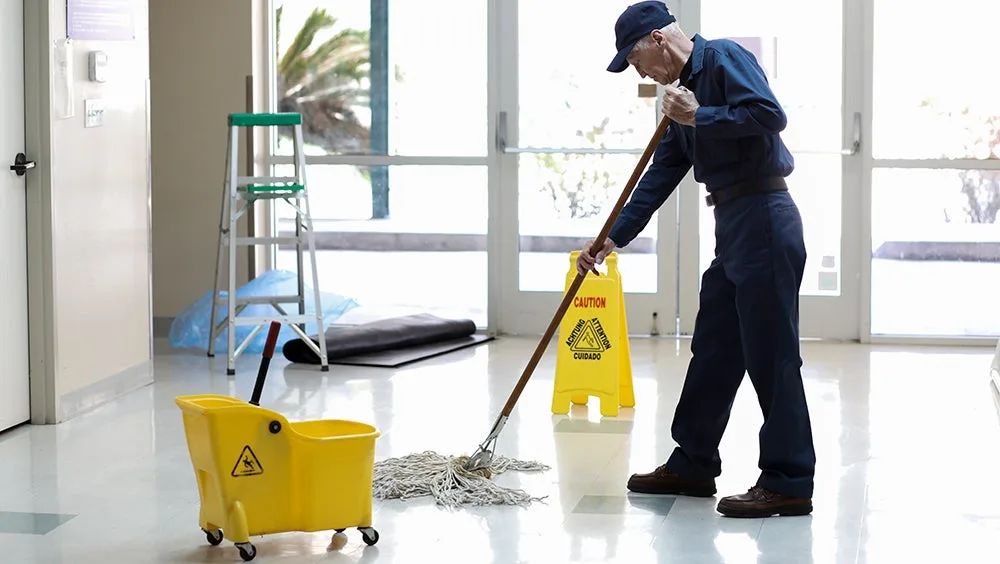Expert Thoughts on Eco-Conscious Cleaning Products

In this blog, I interviewed Building Service Contractor and owner of Pass Janitorial Services, Adam Tan-Ceja, to hear what he thinks of eco-conscious cleaning and disinfecting products and how he uses them in his business.
Adam, can you tell me a bit about your work history and how you came to own Pass Janitorial Services?
Adam: We are a family-owned business, and I am the third generation to own and operate Pass Janitorial. There was never a time in my life that I wasn’t around our company and the day-to-day operations. I have now been fully integrated into the business for 17 years now.
What is your definition of an eco-conscious product?
Adam: For me it comes down to safety — both of the user and the customer. It’s about what is going down the drain and into the trash, ultimately protecting the people who use the products or come into contact with them.
How have eco-conscious product offerings changed in the past 5 years?
Adam: Dramatically, it’s night and day. Several years ago, the eco-conscious cleaning offerings felt very gimmicky. Now eco-conscious products are so integrated into the product lines that we use, they are easier to find, much more abundant, and they are effective. Their effectiveness in particular is what helps them blend in among more traditional products.
I have been really impressed by some eco-conscious cleaning products that have come to the market recently. These products work well and really live up to the values they highlight, like reducing plastic waste and being a more comfortable option for janitors and building occupants.
Have customers or your employees been asking for eco-conscious cleaning and disinfecting products?
Adam: I have several customers with LEED-certified buildings who are required to use eco-conscious products. Aside from these buildings where it is required, most of my customers trust me to bring in the products I think are best for the job, and often the ones I like best and think work best are eco-conscious.
Is there anything that has prevented you from using more eco-conscious cleaning and disinfecting products in your work?
Adam: At Pass Janitorial, we primarily use eco-conscious products. When I use cleaning and disinfecting products that are not eco-conscious, it is only because we have not found an adequate replacement for it, or the product doesn’t lend itself to the process that we need it for. For example, I haven’t found a good eco-conscious substitute for stripping floor wax and sealers. We also haven’t found a suitable substitute in places where we use bleach. However, this is constantly and quickly evolving, and I would not be surprised if there were great alternatives in the near future.
What do you think the biggest advantage of eco-conscious products is over more traditional cleaning and disinfecting products?
Adam: Recent eco-conscious products I have tried are really effective and I don’t have to worry as much about using them on many different surfaces. It’s also about what I am putting in the hands of my employees and their safety as well — I feel more comfortable sending my people into a job with an eco-conscious product.
Speaking of your employees, how do you feel about your staff using eco-conscious cleaning and disinfecting products versus more traditional products?
Adam: I feel much more comfortable having my staff use eco-conscious products. For one, I worry less about the impact these products will have on surfaces. I also feel more comfortable having staff use these for themselves. On the job, I want my staff to use gloves to protect themselves, but sometimes accidents happen, and skin contact occurs, and it just makes me feel better knowing that many eco-conscious products are safe to use without PPE so when accidents happen, I know they will be ok.
What would you say to someone who thinks eco-conscious products can’t work as well as traditional cleaning and disinfecting products?
Adam: I would ask if they have ever tried them, where they have tried them and how. It’s possible they aren’t using the product correctly or don’t have much experience with it. I would challenge them to try using eco-conscious products with the right process in the right place.
What do you think is the right process in the right place?
Adam: Here’s an example: the eco-conscious wipes I have are fantastic and I have been really happy using them, taking them to my clients and explaining what it is. There are some jobs, however, where wipes are not the right product — like in commercial kitchens where the grease is visible and layered. I wouldn’t take a wipe and try to remove that grease. It’s just not the right product for the job.
Anything else you would like to share with a fellow BSC?
Adam: You can find eco-conscious product replacements for just about anything. You just need to look in the right place. For instance, we stopped using a common hinge and machine lubricant and instead started using a vegetable oil-based lubricant for greasing products on the machine. It works even better than the standard product and is way less toxic.
Want to learn more about eco-conscious products?
Come see me at ISSA on Monday November 18, 2024, where I will be presenting and sharing some tips for how to make the switch to eco-conscious products and practices.
















